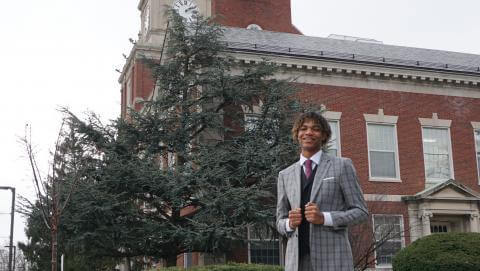Martin Conquers Hackathons with Accessibility Software

Computer Engineering Freshman Devin C. Martin recently conquered at two hackathons: HackHarvard at Harvard University and HackDuke – Code for Good at Duke University. Martin came in third place for Hack Harvard, which had over 400 international participants from across five continents. For HackDuke, Martin placed first among over 300 participants from the nation's top engineering schools, such as the Georgia Institute of Technology, Massachusetts Institute of Technology, New York University, and Yale University. The participants for each hackathon included both undergraduate and graduate students.
The software project that Martin and his team of three other participants developed at HackHarvard highlights a growing ability to address accessibility needs with technology. Martin and his team, international students Vrutik Halani, Simar Kapoor, and Laurence Liang, had three days to create a prototype and innovate on the theme of “connecting the dots”. Their prototype dubbed ConnexionAI aims “to revolutionize the way people with different communication abilities converse with each other using machine learning”.
ConnexionAI is basically a first-of-its-kind software application that serves as an American sign language translator. ConnexionAI has the capability to convert video input of live signing into one or more of three languages: English, Spanish and French. Other features of the software application are speech-to-text conversion and language translation.
“Because our software is focused on bringing awareness to accessibility needs, we are now working with American Sign Language at Harvard to grow our software into a startup company and conduct further research. Our work with American Sign Language at Harvard will also ensure sign language accuracy and optimal accessibility,” says Martin.
Martin and his team are currently working on enhancing ConnexionAI capabilities for it to be able to translate American sign language into over 36 languages.
For HackDuke, in which Martin and his team won first place for the non-profit track, the software project they worked on also addressed an accessibility need. Teams had the option to select from one of five tracks: health and wellness, education, inequality, energy and environment, and nonprofit. Within each track, teams were proposed with a problem and given 24 hours to create a solution that would have a positive impact on society.
Martin and his team, Andrew Chun, Tanmay Dhuri, Katrina Jagadeesan and Sam Kim, were tasked with addressing transportation needs for over 400 constituents of the nonprofit organization Reality Ministries, a nonprofit that brings together people of all abilities. Less than five percent of Reality Ministries’ constituents have the ability to drive themselves. Within 24 hours, Martin and his team delivered their winning prototype: Handoff. Handoff is a ride-sharing and instant messaging software application that connects volunteers and participants through its community messaging platform. Software features include a heat map that indicates the current location of volunteers who are offering rides and other transportation offerings such as group home vans, accessible bus services and public buses; vehicle tracking and live updates; an event planner; and volunteer signup.
What’s next for Martin?
Yes, winning more hackathons, while maintaining his 4.0 GPA.
Martin will also spend his summer at NASA’s Jet Propulsion Laboratory as a software computer systems intern. Martin will be working on the Mars Exploration Program, primarily on the Mars 2020 Mission, which includes the July 2020 launching of the Mars 2020 rover.
“The fact that I can look into space in August and say that I contributed to sending a rover to Mars that could potentially lead to groundbreaking scientific discoveries truly astounds me,” says Martin.
It astounds us as well.
